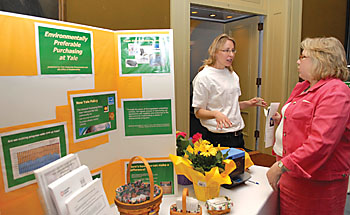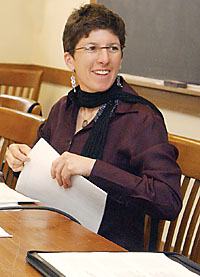YALE’S GROWING ‘GREEN’ INITIATIVES |
| SPECIAL SUPPLEMENT
SPECIAL SUPPLEMENT |
| APRIL 2008
APRIL 2008
 | The office recently sponsored a campus-wide summit that featured a Sustainability Fair, where Yale community members could learn about ways to promote more environmentally responsible practices within their departments.
|
Office works to make sustainability
‘everyone’s business’
Yale’s Office of Sustainability director Julie Newman describes her
job as being like a choreographer: In developing and coordinating University
strategies to become a greener campus, she guides a process by which the success
of the whole depends upon the activity of many parts.
It takes a commitment from a whole array of campus offices, departments and
individuals to advance the goal of becoming a more sustainable campus, notes
Newman. To encourage those various entities to embrace that cause, she must
understand the environmental and human health-related issues in areas as diverse
as transportation, purchasing, cleaning, waste management, energy, water management,
land use, food services, and building design and construction.
Since arriving at Yale in 2004 as the University’s first sustainability
director, Newman has worked toward the development of a comprehensive institutional
strategy for becoming a sustainable campus, engaging administrators, faculty,
staff and students in conversations about how Yale can promote long-term public
and environmental health.
“My goal,” she explains, “is to ‘mainstream’ sustainability — to
make it everyone’s business.”
Newman describes sustainability as it relates to Yale as “a framework
for decision-making in which we have to balance economic viability with ecosystem
health and human health.”
In the past several years, individual offices, departments and units across
the campus have investigated cost-effective ways to contribute to the cause
of a greener campus. In Yale Procurement, for example, that has meant working
toward the creation and adoption of University-wide Environmentally Preferable
Purchasing policies and procedures that make environmental considerations a
top priority when buying products and choosing vendors. In Custodial Services,
staff members have asked the question: “Can we find non-toxic cleaning
products that fit into our budget?”
“Before sustainability became a campus priority, we wouldn’t have
been as focused on what was on the label of a cleaning product or what happened
once that product went down the drain,” Newman says. “We now look
closely at what products and materials we buy, what we eat, how we travel, how
we build and how we use energy or water.”
To track Yale’s progress in becoming more green, Newman developed the
Yale Sustainability Metrics, a comprehensive set of data that measure the University’s
use of natural resources such as water, land, minerals and energy, as well
as systems and processes such as waste management, transportation, building
design and construction, and procurement policies, among other areas.
 | In addition to working closely with student groups, Julie Newman, director of Yale's Office of Sustainability, teaches an undergraduate course on "Sustainable Development and Institutional Change."
|
Just one year after Newman came to the campus, the University created an Office
of Sustainability to add momentum to Yale’s initiative. In 2007, the
office moved into its own newly renovated space — itself a model of sustainable
design practices — at 70 Whitney Ave. Once staffed solely by Newman and
a small cadre of student research assistants, the office has grown to include
Bob Ferretti, an education and outreach manager; project coordinator Keri Enright-Kato,
who oversees initiatives with respect to climate, land, water and biodiversity
on campus; and administrative assistant Pat Cucinotta.
Newman, a lecturer in the School of Forestry & Environmental Studies (F&ES)
who also teaches the undergraduate course “Sustainable Development and
Institutional Change,” has given guidance and support to various student
groups concerned with environmental issues, including the Student Force for
Environmental Partnership (STEP), which works with the Office of Sustainability
to lead an annual campaign to reduce energy consumption and waste production
in the residential colleges. Last year, student energy use was 13% lower than
the previous year, a bigger drop than her office expected, Newman says.
Yale, which has one of the most aggressive greenhouse gas reduction strategies
in the country (see story), has earned national and international attention
for its commitment to developing best practices for a sustainable campus while
maintaining a philosophy of continuous improvement. This is due in part to
Newman’s conversations and collaborations with peers at other higher
education institutions across the globe. Newman’s office has also been
instrumental in furthering global dialogue about how colleges and universities
can advance sustainability by hosting international symposia and conferences
on the subject. Most recently, Newman participated in a panel discussion with
sustainability directors from other schools on the ways in which universities
can contribute to the creation of a more sustainable planet. This discussion
was part of the first Yale Sustainability Summit, which focused on current
University initiatives.
“The University is really at the forefront of the movement toward sustainability
in higher education,” says Newman. “Barely a day goes by where someone
from another college or university doesn’t call our office to ask how we
are handling a particular challenge or issue.”
Under Newman’s leadership, the Office of Sustainability has launched
several recent initiatives in order to promote education, dialogue and action
on issues of sustainability. The following are some of the highlights.
Sustainable events guidelines
Last year, the Office of Sustainability joined forces with Yale Recycling and
the Yale Sustainable Food Project in developing sustainable events guidelines.
The guidelines provide campus event planners and organizers with a set of practical
steps that can be taken to “green” an event, such as minimizing
their event’s carbon footprint by providing locally sourced organic food
options, recycling waste and purchasing renewable energy certificates to offset
the carbon dioxide emissions of those who travel to the event. Events are awarded
a gold, silver or bronze rating depending upon the number of prescribed actions
that are incorporated into them.
Sustainable Master’s Teas series
This program was established two years ago to invite experts from both the
public and private sectors to share their knowledge and experience on sustainability
issues with members of the Yale community. Guests have included Robin Chase,
the founder of Zipcar; Gus Speth, dean of F&ES; Andrew Shapiro LAW ’95,
founder and chief executive officer of GreenOrder Consulting in New York City;
and Judy Wicks, founder of Business Alliance for Local Living Economies, the
White Dog Café and Urban Outfitters.
Sustainability Leaders Program
Through the Sustainable Leaders Program, faculty and staff members help raise
the awareness of their co-workers and colleagues about sustainability, and
promote the use of sustainable practices and products in their offices. Participants
in the program attend a two-hour training workshop to learn about the University’s
sustainability commitments and initiatives, sustainable office practices and
effective ways of raising the awareness of co-workers. They then provide overviews
and updates on Yale’s sustainability efforts during faculty and staff
meetings, and help identify new ways of creating a sustainable office. More
than 30 individuals have become Sustainability Leaders since the program was
established in the fall of 2007.
-
Introduction
Leading by action to promote a better future
New energy programs helping Yale to achieve its goal of
reducing greenhouse emissions 43% by 2020
Newest campus buildings have many earth-friendly features
Office works to make sustainability ‘everyone’s business’
In dining halls and classrooms, project raising awareness about relationship between ‘people, land and food’
Recycling ensures University’s trash is not going to waste
Regulated waste gets special treatment at OEHS
Eli Exchange
Adding zip to Yale’s sustainable transportation options
F&ES dean is an advocate for environmental action on and off campus
Yale experts tackling wide range of environmental issues
Scores of educational programs are devoted to ecological topics
‘Eco-friendly’ Yale merchandise
-
Yale Bulletin & Calendar
|

 YALE’S GROWING ‘GREEN’ INITIATIVES
YALE’S GROWING ‘GREEN’ INITIATIVES |
| SPECIAL SUPPLEMENT
SPECIAL SUPPLEMENT |
| APRIL 2008
APRIL 2008

